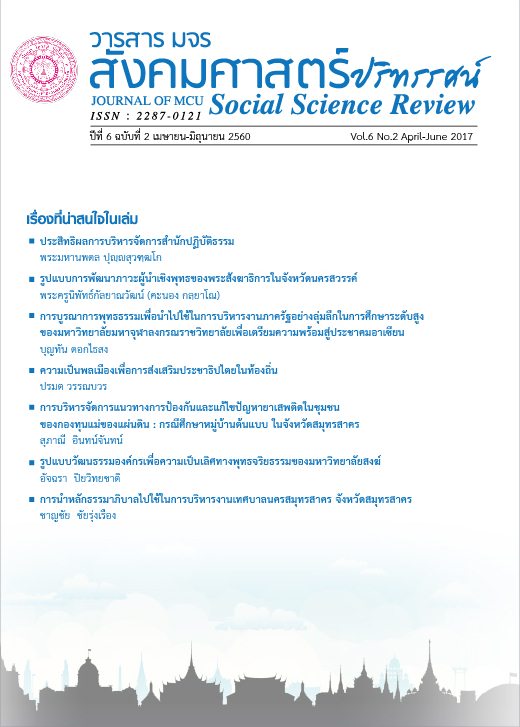การบูรณาการพุทธธรรมเพื่อนาไปใช้ในการบริหารงานภาครัฐอย่างลุ่มลึก ในการศึกษาระดับสูงของมหาวิทยาลัยมหาจุฬาลงกรณราชวิทยาลัย เพื่อเตรียมความพร้อมสู่ประชาคมอาเซียน
คำสำคัญ:
การบูรณาการพุทธธรรม การบริหารงานภาครัฐอย่างลุ่มลึกบทคัดย่อ
การวิจัยเรื่อง “การบูรณาการพุทธธรรมเพื่อนาไปใช้ในการบริหารภาครัฐอย่างลุ่มลึกในการศึกษาระดับสูงของมหาวิทยาลัยมหาจุฬาลงกรณราชวิทยาลัยเพื่อเตรียมความพร้อมสู่ประชาคมอาเซียน” มีวัตถุประสงค์เพื่อ 1) ศึกษาการบูรณาการพุทธธรรมนาไปใช้ในการบริหารงานภาครัฐอย่างลุ่มลึกในการศึกษาระดับสูงของมหาวิทยาลัยมหาจุฬาลงกรณราชการวิทยาลัยเพื่อเตรียมพร้อมสู่ประชาคมอาเซียน 2) เพื่อศึกษาปัจจัยที่ส่งผลต่อการบูรณาการพุทธธรรมนาไปใช้ในการบริหารงานภาครัฐอย่างลุ่มลึกในการศึกษาระดับสูงของมหาวิทยาลัยมหาจุฬาลงกรณราชการวิทยาลัย เพื่อเตรียมพร้อมสู่ประชาคมอาเซียน 3) เพื่อนาเสนอหลักรัฐประศาสนศาสตร์เชิงพุทธธรรมเพื่อบริหารภาครัฐอย่างลุ่มลึกในการพัฒนาทุนทางปัญญาของมหาวิทยาลัยมหาจุฬาลงกรณราชวิทยาลัยเพื่อเตรียมความพร้อมสู่ประชาคมอาเซียน
การวิจัยนี้เป็นการวิจัยผสานวิธี โดยใช้แบบสัมภาษณ์เชิงลึกแบบมีโครงสร้าง สัมภาษณ์ผู้เชี่ยวชาญทางพุทธศาสตร์และรัฐประศาสนศาสตร์ 18 รูป/คน และใช้แบบสอบถามจากกลุ่มตัวอย่าง 400 รูป/คน ที่เป็นตัวแทนประชากร 6000 รูป/คน ในจานวนนี้เป็นประชากรมหาวิทยาลัยมหาจุฬาลงกรณราชวิทยาลัย 5,000 รูป/คน และมหาวิทยาลัยมหามกุฏราชวิทยาลัย 1,000 รูป/คนในส่วนข้อมูลคุณภาพนามาวิเคราะห์เชิงตรรกะ ส่วนข้อมูลปริมาณนามาวิเคราะห์ด้วยโปรแกรม สาเร็จรูปเพื่อการวิจัยทางสังคมศาสตร์ โดยนาข้อมูลทั้งสองส่วนมาวิเคราะห์ทาความเข้าใจเรื่องที่ศึกษาวิจัยและอธิบายความสัมพันธ์ระหว่างตัวแปรเหตุและผล
ผลการวิจัย
1) พบหลักพุทธธรรม 9 ประการ เพื่อการบริหารงานภาครัฐ ได้แก่ 1.1) พุทธบริหารที่มีเป้าหมายเป็นอุดมการณ์ 1.2) พุทธองค์การ ได้แก่หลักการทางานร่วมกัน 1.3) การวางแผนเชิงพุทธโดยยึดหลักอริยสัจ 1.4) ความเชี่ยวชาญเชิงพุทธ มอบอานาจให้กับผู้มีความสามารถ1.5) การบริหารความขัดแย้งเชิงพุทธ 1.6) พุทธบริการ โดยใช้หลักสังคหวัตถุ 4 1.7) พุทธจริยธรรมาภิบาล 1.8) พุทธสัปปายะ อยู่ในปฏิรูปเทศ 1.9) สัมฤทธิผลเชิงพุทธ ความสงบสันติสุข2) พบปัจจัยที่ส่งผลต่อการบูรณาการ ได้แก่ การประเมินความต้องการในการศึกษาระดับสูงตามหลักสูตรรัฐประศาสนศาสตร์ใหม่ (x6) การบูรณาการหลักพุทธธรรมและหลักการบริหารภาครัฐ (x3) การนาเสนอหลักการและกระบวนการบริหารภาครัฐ (x2) การออกแบบหลักสูตรรัฐประศาสนศาสตร์(X5)และหลักพุทธธรรมที่นาไปประยุกต์ใช้ในสาขารัฐประศาสนศาสตร์(x4) สามารถใช้พยากรณ์การบูรณาการพุทธธรรมเพื่อนาไปใช้ในการบริหารภาครัฐอย่างลุ่มลึกในการศึกษาระดับสูงของมหาวิทยาลัยมหาจุฬาลงกรณราชวิทยาลัยเพื่อเตรียมพร้อมสู่ประชาคม อาเซียน (Y) ได้ที่ระดับนัยสาคัญทางสถิติที่ 0.05 โดยมีค่าสัมประสิทธิ์การตัดสินใจที่ปรับแล้ว (R2) เท่ากับ ร้อยละ 42.10
3) หลักการบริหารงานภาครัฐแบบบูรณาการประกอบด้วยหลักปฏิบัติธรรม หลักศาสตร์การบริหารทุนมนุษย์ หลักการพัฒนาทรัพยากรมนุษย์ หลักการจัดการความรู้ หลักนโยบายศาสตร์ หลักการจัดการนวัตกรรม หลักการจัดการสภาวะแวดล้อม หลักการป้องกัน สร้างสมดุลทางจิต และหลักธรรมาภิบาลโลก
เอกสารอ้างอิง
Henri Fayol. (1916). General and Industrial Management. London: Sir Isaac Pitman and Sons.
Mahachulalongkornrajavidyalaya University. (2016) Thai Tripitaka Mahachulalongkornrajavidyalaya Version. Bongkok: Mahachulalongkornrajavidyalaya Publication.
Mahoney, J.T. (2002). ‘The relevance of Chester I. Barnard’s Teachings to Contemporary Management Education: Communicating the Aesthetics of Management’, International Journal of Organization Theory and Behavior. 5(1&2), 159-172.
Phrakhrusamu Natthaset Athiyano. (2016). The Development of Management on Public Construction and Renovation of Sangha Administrators Region 11. Journal of MCU Social Science Review, 5(2), 1-14.
Sutthiporn saithong. (2016,May-August) Buddhist Approach to knowledge Management for Development the Sangha College in upper Northern Thailand. Journal of MCU Social Science Review, 5(2), 85-96.
Thanin Silpcharu. (2008). Statistical Research and Data Analysis by Using SPSS. 9th Edition. Bangkok: Business R&D.
ดาวน์โหลด
เผยแพร่แล้ว
รูปแบบการอ้างอิง
ฉบับ
ประเภทบทความ
สัญญาอนุญาต
ลิขสิทธิ์ (c) 2018 วารสาร มจร สังคมศาสตร์ปริทรรศน์

อนุญาตภายใต้เงื่อนไข Creative Commons Attribution-NonCommercial-NoDerivatives 4.0 International License.
เพื่อให้เป็นไปตามกฎหมายลิขสิทธิ์ ผู้นิพนธ์ทุกท่านต้องลงลายมือชื่อในแบบฟอร์มใบมอบลิขสิทธิ์บทความให้แก่วารสารฯ พร้อมกับบทความต้นฉบับที่ได้แก้ไขครั้งสุดท้าย นอกจากนี้ ผู้นิพนธ์ทุกท่านต้องยืนยันว่าบทความต้นฉบับที่ส่งมาตีพิมพ์นั้น ได้ส่งมาตีพิมพ์เฉพาะในวารสาร มจร สังคมศาสตร์ปริทรรศน์ เพียงแห่งเดียวเท่านั้น หากมีการใช้ภาพหรือตารางหรือเนื้อหาอื่นๆ ของผู้นิพนธ์อื่นที่ปรากฏในสิ่งตีพิมพ์อื่นมาแล้ว ผู้นิพนธ์ต้องขออนุญาตเจ้าของลิขสิทธิ์ก่อน พร้อมทั้งแสดงหนังสือที่ได้รับการยินยอมต่อบรรณาธิการ ก่อนที่บทความจะได้รับการตีพิมพ์ หากไม่เป็นไปตามข้อกำหนดเบื้องต้น ทางวารสารจะถอดบทความของท่านออกโดยไม่มีข้อยกเว้นใดๆ ทั้งสิ้น





